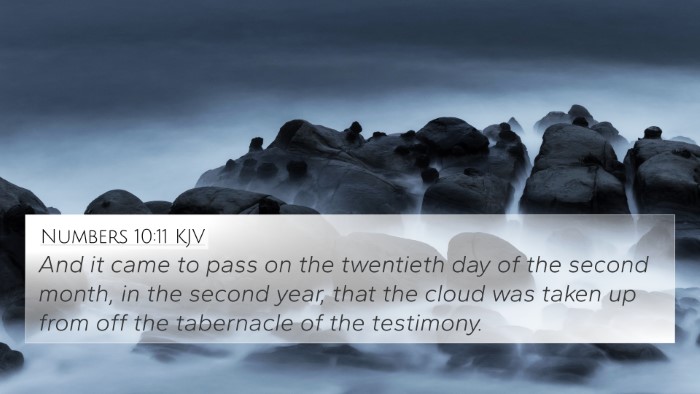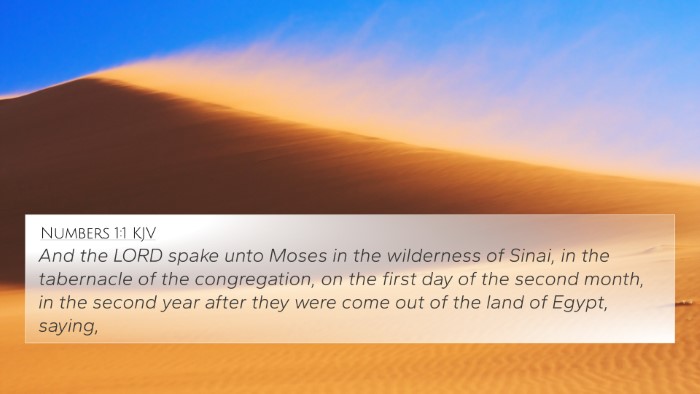Understanding Leviticus 25:1
Leviticus 25:1 reads: "And the LORD spake unto Moses in mount Sinai, saying," This verse serves as the introduction to a significant chapter regarding the Sabbath year and the Year of Jubilee. It highlights God's direct communication with Moses, which underscores the authority of the laws that follow.
Summary of Insights from Public Domain Commentaries
This verse lays the groundwork for the laws pertaining to the Jubilee, revealing the importance of sabbatical rest not only for the land but for the people of Israel. It emphasizes themes like rest, redemption, and stewardship. Various commentaries provide important insights into the implications of this divine instruction.
Matthew Henry's Commentary
Matthew Henry emphasizes that God's law is communicated clearly and authoritatively through Moses. Henry reflects on the spiritual significance of God's command to rest the land every seventh year. He posits that this serves as a reminder of God's provision and care for creation, urging the Israelites to trust in His sustenance during the fallow years.
Albert Barnes' Notes
Barnes notes that Leviticus 25 introduces a pivotal section of the Torah that outlines the Israelites' social structure and agricultural practices. He highlights that the rest commanded in the Sabbatical year allows the land to rejuvenate, symbolizing spiritual renewal and dependence on God. Barnes identifies the linkage to themes of freedom and restored relationships among the community through practices stipulated in the following verses.
Adam Clarke's Commentary
Adam Clarke highlights the significance of the context, focusing on the date of the command, which is situated in the wilderness at Sinai. He illustrates that this divine instruction is not just about agricultural law; it is fundamentally about teaching God's people the importance of mercy, generosity, and fairness in their dealings with one another.
Thematic Connections
The themes in Leviticus 25:1 relate to various concepts found throughout the Bible, including:
- Divine Communication: The manner in which God speaks to His people, similar to Exodus 20:1.
- The Year of Jubilee: See Leviticus 25:10-13, which details the practices surrounding the Year of Jubilee, emphasizing freedom and restoration.
- Rest and Renewal: Similar themes are present in Mark 2:27, where Jesus speaks on the Sabbath's purpose.
- God's Provision: Referenced in Matthew 6:26-30, indicating God's care for creation.
- Social Responsibility: Related teachings in Deuteronomy 15:1-2, about canceling debts every seven years.
- Redemption: Found in Leviticus 25:25-27, which also includes the concept of redeeming property.
- Completion and Wholeness: Implied in the seven-fold pattern seen in Genesis 2:2-3 regarding the creation week.
Bible Verse Cross-References
This verse can be connected to numerous others that further illustrate its themes:
- Exodus 20:8-11 - The Sabbath commandment.
- Isaiah 61:1-2 - Prophecy regarding liberation.
- Luke 4:18-19 - Jesus' mission aligns with the spirit of Jubilee.
- Matthew 5:17 - Jesus’ affirmation of the law.
- 2 Corinthians 5:17 - The new creation and renewal theme.
- Galatians 5:1 - Freedom in Christ, resonating with Jubilee themes.
- Hebrews 4:9-10 - The ultimate Sabbath rest.
Conclusion
The exploration of Leviticus 25:1 reveals profound messages about God's instructions for rest, covenant, and community ethics. It serves as a potent reminder of our ongoing need for spiritual and physical renewal, a theme that resonates throughout Scripture.
Using Cross-References for Deeper Study
Engaging in cross-references enriches personal study of the Bible. Tools such as a bible concordance and bible cross-reference guide can be indispensable. They assist in identifying connections between Bible verses that can illuminate understanding and foster deeper insights into Biblical themes.
Final Thoughts
As you dive deeper into Leviticus 25:1 and its related verses, consider the broader narrative within the Scripture that calls for contemplation on themes of liberty, rest, and divine provision. Understanding and applying these themes can lead to a transformative journey in your spiritual life.






